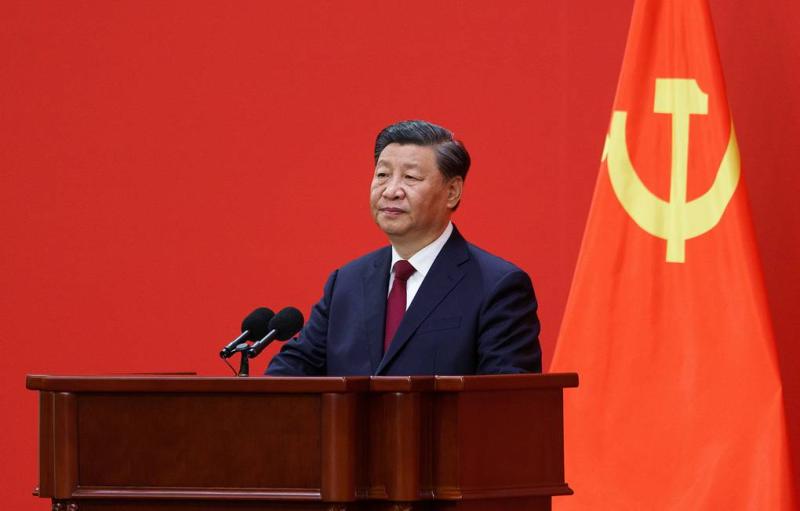
© Artyom Ivanov/TASS
February 24 saw China present its plan for resolving the Ukrainian situation titled "China’s Position on the Political Settlement of the Ukraine Crisis." The document contains 12 points urging to respect the sovereignty and territorial integrity of all countries; to abandon the cold War mentality, expansion of military blocs and attempts to ensure any country’s safety at somebody else’s expense; to cease hostilities in Ukraine; to avoid escalation by pushing Kiev and Moscow to dialogue; to boost humanitarian efforts in the conflict zone, including through the UN agency; to establish an exchange of prisoners of war; to ensure safety of Ukrainian nuclear power plants; to abandon threats of using weapons of mass destruction, including nukes; to facilitate Ukrainian grain exports; to abandon unilateral sanctions policy and oppose using the world economy as a tool or weapon for political purposes; to promote post-conflict reconstruction, which the Chinese side is traditionally ready to engage in.
The document’s content shows Beijing offering a solution to the Ukrainian conflict by political means, calls for a ceasefire and suspended arms supplies to Kiev. The intended recipients are not only the warring parties and Kiev-backing Western states, but also countries that have chosen neutrality.
Western states have grown irritant to China's plan with quite a number of arguments. Thus, NATO Secretary General Jens Stoltenberg said at a press conference in Tallinn that it should be not paid due regard given Moscow and Beijing's congeniality. A number of Western leaders do not consider the latter a perfect international mediator, with US President Joe Biden dubbing China’s suggestions "simply irrational." "I’ve seen nothing in the plan that would indicate that there is something that would be beneficial to anyone other than Russia if the Chinese plan were followed," he said in an interview with ABC News.
The US President is echoed by Secretary of State Anthony Blinken, who said members of the UN Security Council “should not fall into the false equivalency of calling on both sides to stop fighting”, because Russia will use any pause in hostilities to strengthen control over the controlled territories or reinforce its troops. His deputy Victoria Nuland stressed that the White House is opposed to any plans, which would envisage "a cynical ceasefire" that could only benefit Russia having once again demonstrated that people’s lives, including those of Ukrainians, are nothing to Washington.
German Foreign Minister Annalena Baerbock sententiously said China should develop proposals within the UN Charter and recognize Ukraine’s right to self-defense.
So, why doesn’t the West like China's initiative?
First, they have deemed it as undermining Western efforts to attract so far neutral countries to the pro-Ukrainian coalition (at the recent UN General Assembly 40+ countries failed to endorse the West's proposal to make Russia unconditionally withdraw from Ukraine). They regard abstinence or peace calls as tantamount to approving of Russia.
Also, they loathe China’s virtual call to review the Western and Ukrainian key approaches to the conflict, as it urges to respect everyone’s sovereignty and territorial integrity, as well as the UN Charter, but fails to mention Ukraine or suggest a withdrawal of Russian troops (which is Kiev’s major Western-backed demand). The Chinese propose to make the warring parties start direct negotiations without any of Kiev's Western allies.
A number of experts consider the clause on respecting territorial integrity not so much pro-Ukrainian as pro-Chinese, related to the Taiwanese issue. Beijing seems to pose a question to the West: once you are obsessed with Ukraine’s territorial integrity, why don't you respect that of China?
Western politicians hate the thesis about adding fuel to the fire and pumping up confrontation, because this broadly hints at shoveling Western weaponry onto Kiev.
Moreover, the Chinese call for giving up on sanctions, the centerpiece of the Western toolbar for punishing undesirables.
In the document, Beijing has once again criticized the principle of establishing military blocs and involving regional powers in them. This is vital for China itself, as Washington is forming a coalition against it, by means of structures like AUKUS (Australia, Great Britain and the USA).
Besides, China's appeal was addressed to "third countries", i.e. those who did not pick a side in the conflict as yet. Claiming moral leadership primarily among the so far neutral states, pro-peace China accuses the West of fueling the conflict. So, the "Chinese plan" looks like an element of global ideological competition with the USA. Seeking to gain over the Global South, Beijing condemns sanctions pressure, subsequent destruction of world trade, and Western-induced crises.
With this in mind, even before Beijing released its peace proposals, the West launched a fake campaign on possible military assistance to Russia allegedly being considered by the Chinese leadership. This looks like an attempt to discredit China's position in the race for the "neutrals", while strengthening Western unity, which the US claims being threatened by China’s peacemaking approach.
Still, this stance has caused ever-growing discontent worldwide. The Global South is not quite so keen to join US and EU’s Ukraine policy, tending to comprehend the Western counties’ vested interest. Criticism goes way up as regards actions by their governments in Western countries proper.
By rejecting the Chinese peace initiative, the latter demonstrate their interest in proceeding with hostilities. Western response to Beijing's initiative implies that it still cannot accept the loss of global dominance or present-day world’s multipolarity — an obviously stillborn approach.









